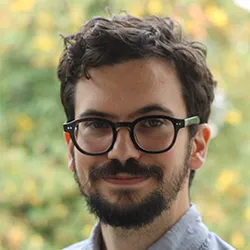
Dr Stefano Bo is a Lecturer in Physics. He is part of the Biological Physics and Soft Matter group and his research focuses on randomness - how it impacts living systems, and the strategies to cope with it and exploit it.
What first attracted you to the field of physics?
I realised early on in life that trying to understand how the world works added to its beauty. This attracted me to science and I liked the fact that physics addresses truly fundamental questions looking to unveil the underlying general principles.
During my undergraduate studies, I witnessed how life sciences progressively became more quantitative, inviting the application of tools and concepts from physics. The fact that living systems are constantly solving very difficult physics problems to survive and prosper truly fascinates me.
What do you think is the biggest misconception people have about physics?
I think many people believe that physics is just about dry facts and answers. I find it to be very much about the questions, the reasoning, and the analogies. It is in this spirit, that a physics mindset can be applied to solve problems in different fields, including life sciences.
What's an exciting project that you're working on at the moment?
I am working on understanding how cells use physics to organise their internal structure. It has recently been shown that, in addition to building compartments that need membranes to separate them from the rest, cells can construct compartments that do not need membranes. Their dynamics can be explained using the same physical theories that describe how oil and water do not mix but form separate coexisting phases. I am interested in understanding how these compartment help cells to function reliably despite the uncertainty and randomness that dominates the world at their scale.
What are you most proud of in your career to date?
I am proud of working in an interdisciplinary environment where I have managed to establish fruitful interactions between my theoretical investigations and the work of my experimental collaborators, who sometimes come from very different backgrounds.